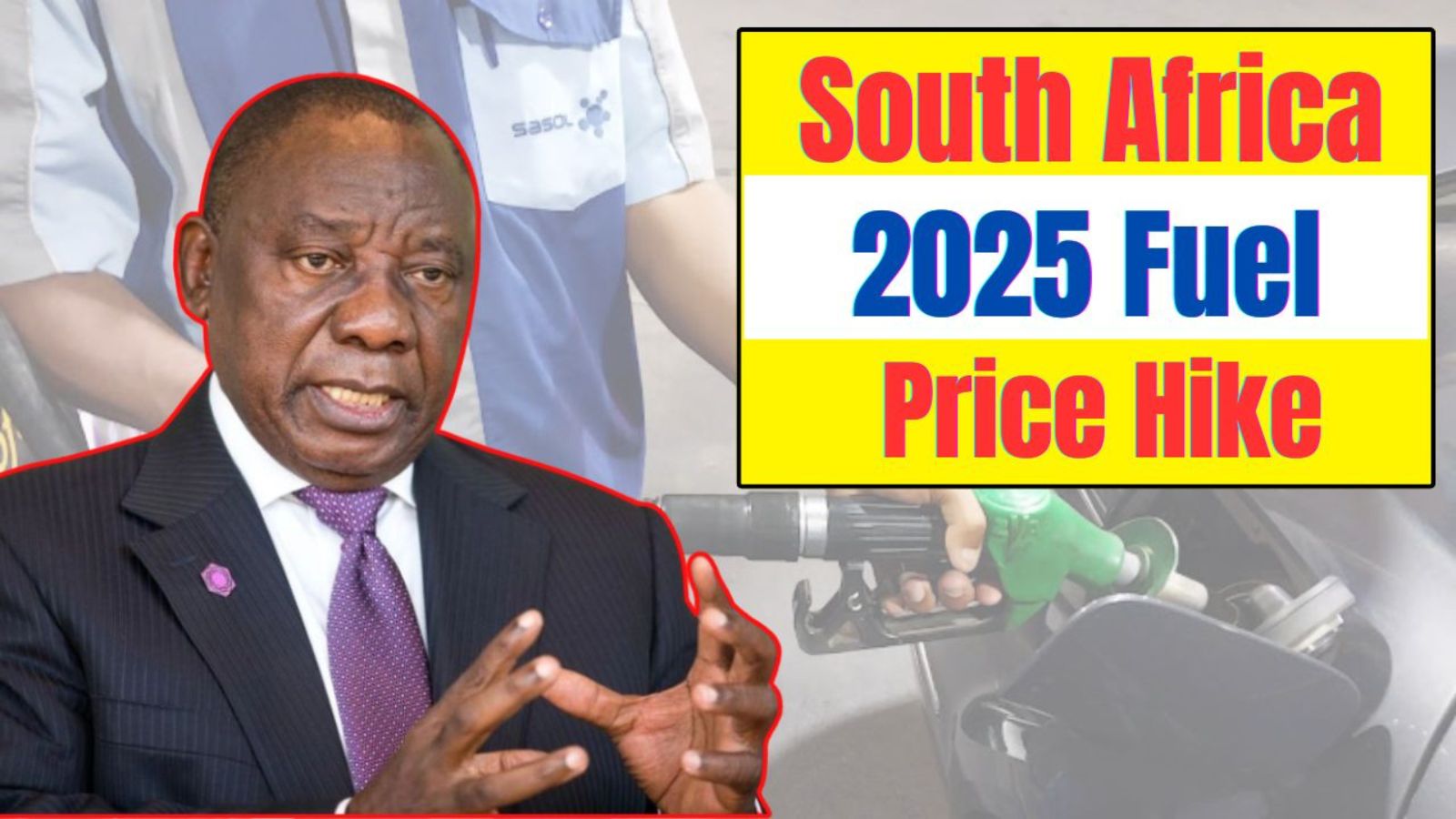South Africans are bracing themselves for a significant surge in fuel costs as the South Africa June 2025 fuel price hike looms. Petrol and diesel prices are expected to rise sharply, with implications that stretch far beyond the fuel stations. The upcoming increase, driven by a complex mix of international, national, and logistical factors, is already generating alarm among drivers, businesses, and households.
This article explores the underlying reasons for the expected price hike, its potential impacts across various sectors, the government’s potential response, and the long-term consequences for the country.
South Africa June 2025 Fuel Price Hike: Economic and Global Factors Driving the Increase
At the center of the South Africa June 2025 fuel price hike is a perfect storm of economic pressures. On the international stage, crude oil prices have surged due to geopolitical instability in the Middle East, including escalating conflicts that have disrupted global supply routes. These tensions have pushed oil-producing countries to tighten supply, reducing exports and thereby inflating global oil prices.
Compounding these issues is the weakening of the South African rand against the US dollar. Oil transactions on the global market are denominated in dollars, which means a weaker rand directly increases the cost of imported oil. As of mid-May 2025, the rand has lost considerable ground against the greenback, making the prospect of importing fuel even more costly for South African companies.
Adding fuel to the fire, local refinery constraints have further exacerbated the situation. Several domestic refineries are operating at reduced capacity due to maintenance backlogs, technical issues, or permanent closures. As a result, the nation is heavily reliant on imported refined petroleum products, making it even more susceptible to international price shifts.
South Africa June 2025 Fuel Price Hike: The Impact on Transportation and Logistics
Transportation is one of the sectors most immediately affected by the South Africa June 2025 fuel price hike. Freight companies, logistics service providers, and public transport operators all depend heavily on fuel to operate. A significant rise in diesel prices will increase the cost of transporting goods across the country, which is almost always passed on to the end consumer.
Public transport systems, especially minibus taxis and regional bus services, are also set to experience financial strain. To maintain profitability or break even, fare increases may become inevitable. This will hit lower-income commuters the hardest, many of whom rely daily on public transport to get to work or access essential services. As transport fares rise, so too will the daily expenses of countless South Africans already grappling with economic hardship.
South Africa June 2025 Fuel Price Hike: Ripple Effects on Food and Retail Prices
When fuel prices increase, the knock-on effect often spreads across the entire economy. In particular, sectors that depend heavily on transportation and distribution are likely to see substantial cost increases. For the food industry, the effects can be especially damaging.
Food producers and retailers depend on long, fuel-reliant supply chains to deliver perishable goods on time. With diesel and petrol prices climbing, transportation costs surge, and these costs will inevitably be reflected in retail prices. Consumers can expect to see price hikes in staple food items such as maize meal, bread, milk, vegetables, and meat.
Retailers, especially those located in remote areas, will also face higher operational expenses. The delivery of goods to retail outlets, warehousing, and in-store utilities will all be affected. Ultimately, it is the consumer who pays the price, both figuratively and literally, as inflationary pressures mount.
South Africa June 2025 Fuel Price Hike: Strain on Household Budgets
Perhaps the most palpable impact of the South Africa June 2025 fuel price hike will be felt at the household level. For millions of families already walking a financial tightrope, the added burden of higher fuel prices could push many into more precarious economic conditions.
Daily commuting becomes more expensive, road trips may be postponed or cancelled, and discretionary spending on non-essential items is likely to decrease. As a result, sectors such as hospitality, entertainment, and even retail could experience a slowdown in consumer demand.
Households with private vehicles will need to spend more at the pump, while those relying on public transportation could face increased fares. Parents who drive children to school, individuals who commute long distances for work, and small business owners who depend on delivery services will all feel the pinch.
Moreover, the hike will not only affect urban dwellers. Rural communities, which often face limited access to fuel and rely on deliveries from major towns, may suffer even more pronounced price increases.
South Africa June 2025 Fuel Price Hike: Government and Industry Responses
The projected South Africa June 2025 fuel price hike has not gone unnoticed by the government and industry stakeholders. Economists and consumer advocacy groups have called for urgent policy responses to cushion the impact on vulnerable populations.
Among the most discussed proposals is the temporary reduction or suspension of certain fuel levies and taxes. However, with fiscal pressures mounting from other sectors, including healthcare, education, and infrastructure, the government may find it challenging to implement such measures without incurring long-term deficits.
There is also growing pressure on the government to revisit the fuel pricing formula, which currently incorporates international benchmark prices, currency exchange rates, and various levies. Critics argue that the system is too rigid and does not offer enough flexibility during economic crises.
On the industry side, logistics firms and transport associations are lobbying for subsidies or rebates that would allow them to maintain service levels without significantly increasing prices. Meanwhile, energy experts are advocating for accelerated investment in alternative energy sources, including electric vehicles and locally refined biofuels.
South Africa June 2025 Fuel Price Hike: Long-Term Implications
While the June hike is an immediate concern, it also sheds light on deeper structural issues within South Africa’s energy and economic infrastructure. The South Africa June 2025 fuel price hike is a symptom of the nation’s overreliance on imported fuel and a vulnerable currency.
South Africa lacks sufficient domestic refining capacity, making it heavily dependent on international oil markets. Any disruption abroad—be it from conflict, trade restrictions, or production cuts—can have an outsized impact on local fuel prices. This situation has persisted for years and underlines the need for strategic reform.
There is a strong case for investing in local fuel production facilities or revamping existing refineries to meet domestic demand. Doing so could provide more control over pricing and reduce exposure to volatile foreign markets. Furthermore, the nation must explore cleaner and more sustainable fuel alternatives. The push for electric vehicles (EVs), solar-powered public transport systems, and renewable energy-based logistics operations needs to be prioritized.
Without such structural shifts, future fuel price hikes could become more frequent and more severe, with even greater socio-economic repercussions.
Conclusion
The South Africa June 2025 fuel price hike is shaping up to be one of the most impactful economic events of the year. With petrol and diesel costs set to rise significantly, the consequences will be felt throughout every layer of society—from logistics and retail to public transport and household finances.
While short-term relief measures may offer some respite, the long-term solution lies in reducing dependency on imported fuel, strengthening the rand, and investing in sustainable alternatives. In the meantime, South Africans will need to brace themselves for tighter budgets, more expensive goods and services, and a challenging economic landscape in the months ahead.
The upcoming South Africa June 2025 fuel price hike is more than just an increase at the pump. It is a mirror reflecting deeper vulnerabilities in the country’s energy strategy, infrastructure planning, and fiscal policy. Addressing these root causes will require cooperation across all levels of government, industry, and civil society to build a more resilient and economically secure future for all citizens.
Some Important Link
| Telegram Group | Click Here |
| WhatsApp Group | Click Here |
| Home Page | Click Here |













